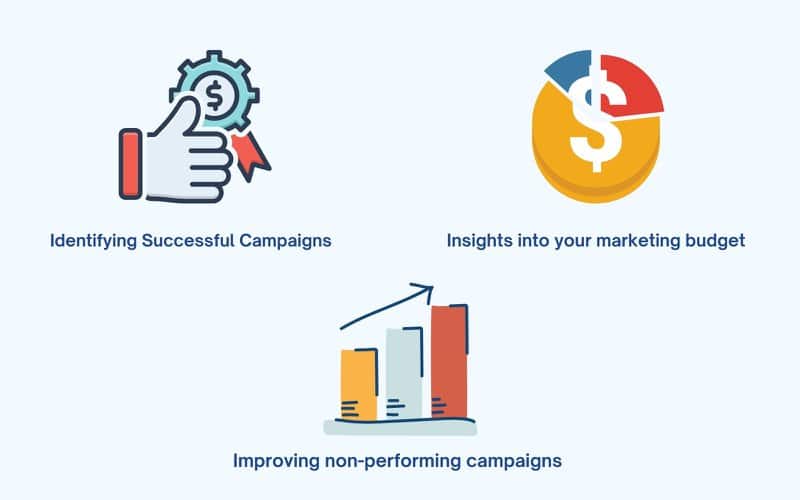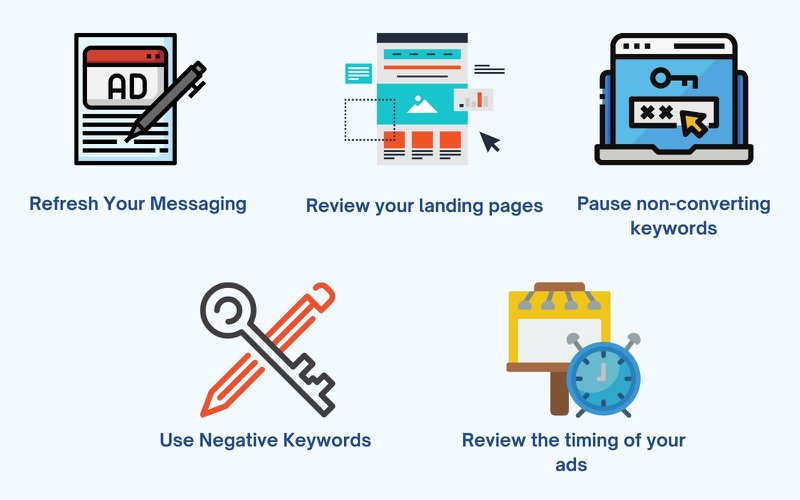
Marketing metrics are crucial to your marketing campaigns. After all, how else can a company know if its marketing efforts are in the right direction? Conversion cost or cost per conversion is one such marketing metric. In this article, we will discuss the same.
When it comes to marketing, timing is essential. As a result, businesses need to be proactive in making changes at the right time. That’s where these marketing metrics come in. There are several vital metrics companies measure. And the cost per conversion is one of them.
It is a metric that can help you get a better return on your marketing investments. But what is conversion cost or cost per conversion? Read on to find answers to all your questions.
Here is a table of contents to summarize the main point we will cover in this article:
- What Is Conversion Cost or Cost Per Conversion (CPC)?
- Differences with Cost per Click.
- How to Calculate Conversion Cost?
- Why Is Calculating Conversion Cost Key for Your Business?
- How to Reduce Your Conversion Cost?
- Manage Your Campaigns Better
To make good use of this marketing metric, you should know how to calculate it. And before calculating it, you must have a clear understanding of it.
What Is Conversion Cost?
The conversion cost tells you how much you are spending on average to convert one customer. Note that the spend we are talking about is the marketing spend. Also, this cost is commonly referred to as cost per conversion (CPC).
Now, you can define what you mean by the term “conversion.” Many people only consider purchases as conversions, but some companies call it a conversion even when a user signs up for the newsletter. So, how you define conversions for your campaign is up to you.
This is a crucial point to keep in mind. When creating a marketing campaign, you must clearly define such terms. If you don’t, it can cause a lot of confusion later on. So make sure you decide on these factors before your campaign goes live.
When defining conversion for your campaign, look at your requirements. Do you plan a lot of events to engage the visitors? If yes, users signing up for one such event can be seen as a conversion. On the other hand, you can choose to see only purchases as conversions. The choice is yours!
Don’t Confuse It With Cost per Click.
As we discussed, people commonly refer to conversion cost as cost per conversion. In short, they sometimes call it CPC. And here’s where some people fall prey to confusion. between CPC and cost per click, which is an entirely different metric.
So, make sure you don’t make the same mistake. While looking at the data, make sure you read these terms carefully. The last thing you want is to read the data wrong and make your decisions based on that.
How Can You Calculate Conversion Cost (or Cost per Conversion – CPC)?

Let’s move on to the main question. How can you calculate the conversion cost? Luckily, the formula involves simple division. Here it is:
Conversion Cost = Total cost of the campaign/ Total number of conversions made.
What do you need to calculate? First of all, you should know the total amount of money spent on a campaign. And you should see the number of conversions from that campaign. Then all you need to do is simple division, and you have your answer.
Let’s make it easier with an example,
You spent $3,000 on a marketing campaign. From that campaign, you got 60 conversions. Remember, how you define what a conversion is, is up to you. And this means, if you consider someone subscribing to your blog as a conversion, that’s what you are counting here. Now by dividing $3,000 by 60, you get $50. So the conversion cost of this campaign is $50.
Eventually, it means that every conversion out of this campaign costs you $50! Is it a good conversion cost? Well, this was only an example. But how do you know if your conversion cost is suitable for your business? Unfortunately, there is no easy answer to this.
A reasonable conversion cost depends on a lot of factors. These factors include the industry and your product or service. So, you will have to find the answer to this question. But you can search and find ways to determine an impressive conversion cost for your business.
For now, let’s move on to the importance of calculating conversion cost. And after that, we will share some tips with you to reduce your conversion cost. So, read on to get to that helpful stuff.
Why Is Calculating CPC Key for Your Business?

In today’s marketing world, the competition is stiff. And that’s why your marketing campaigns need to be good. After all, your competitors will keep strategizing and coming back stronger. And that’s why you have no room for complacency.
And calculating conversion costs often will help you stay on your toes. How? Here are some factors that make calculating conversion costs essential for your business.
Identifying Successful Campaigns
Every metric gives you a report card of your marketing campaign. And the same goes for cost per conversion.
Every company runs several marketing campaigns, including different social media platforms, Amazon, or Google Adwords. Unfortunately, not all your marketing efforts will bear the same fruit. Some will be successful from the word go. And some won’t give you the desired results.
That’s why you must review your marketing campaigns. First of all, it’s to see which of your campaigns are successful. Some of your campaigns might turn out to be fantastic.
And knowing the conversion cost will help you spot them. Then you can capitalize on these campaigns if there’s room for improvement.
What does this do for your business? First, it gives a boost to your campaigns that are already delivering. Second, not all your competitors will be as proactive as this. In the long run, these minor changes can help you leave your competitors behind.
Improving Non-Performing Campaigns
Now, what about the marketing campaigns that are not working? These campaigns need your attention and quickly. And if you keep a tab on the conversion cost, you can make meaningful and timely changes to these campaigns.
In a nutshell, you can make an informed decision. You can have discussions with your marketing team regarding these non-profitable campaigns. Maybe one such campaign has immense potential to succeed. And all it needs is a few tweaks here and there.
That’s why it is vital to keep a tab on metrics such as conversion cost. It can help you have these crucial discussions at the right juncture, and it also keeps your marketing teams on their toes. Moreover, it can help you turn your struggling campaigns into profitable ones.
Insights Into Your Marketing Budget
Marketing costs can often shoot through the roof.
But it usually happens when business owners aren’t smart with the budget. Instead, they spend loads of money on campaigns that once worked for them. Or they don’t spend enough on campaigns that have the potential.
Calculating conversion costs can give you some vital insight into your marketing budget, either o digital or non-digital marketing worlds. It tells you where to spend the money and where not to, which becomes even more critical for small and medium-sized businesses.
After all, the last thing such companies can afford is to be reckless with their marketing budget.
How to Reduce Your Conversion Cost?

Calculating conversion costs is essential. But what if you can reduce the conversion cost? You will have more ad spend to run more campaigns. In a nutshell, you will get a better return on your paid campaigns.
So, here are five tips to reduce your conversion cost.
Refresh Your Messaging
We often take our performing ads for granted. But sometimes, our performing ads are yet to realize their full potential.
Make sure the ad copy is crisp and interactive. Keep testing new messaging in front of your audience. After all, no audiences like the repetitive phrases and punchlines.
Also, make sure your call to action is clear. Use action words like “contact us” and “get a quote.” These words are direct, and that’s what call-to-action is about.
So, make sure you make good use of these action words in your ad copy. And it will increase your conversion rate and reduce the conversion cost.
Review All Your Landing Pages
Not all your landing pages will have the same conversion rate. So, make sure you review all your landing pages. In this article, we talk about helpful landing page techniques.
Remember, you don’t have to check only the performing ones. And you don’t have to pay all your attention to the ones with a low conversion rate.
Take your time when you go through these landing pages. Make a few tweaks wherever necessary.
Also, consider sending more visitors to your best-performing landing page. This will help you make more conversions. And a better conversion rate will reduce the conversion cost.
Make sure you do this often. As we discussed above, minor changes can make a big difference to your marketing campaign.
Pause All Your Non-Converting Keywords
The Non-performing keywords can pose a problem. Yes, it would be best if you paused these keywords. But wait, here’s where you need to be extra careful. What if you end up pausing a keyword that has great potential? It would be like getting rid of a future winner, right?
That’s why you need to trust the data. Take a look at all the relevant metrics before you decide to pause any keyword. Know your target conversion cost and the current conversion rate. And keep these numbers in mind while getting rid of a keyword.
On the positive side, reviewing your keywords can help you make essential changes. And you can then use new keywords that might perform better.
Use Negative Keywords
Negative keywords are crucial for every PPC campaign. Some say that your PPC campaign can’t function properly without negative keywords. And there are loads of benefits of using negative keywords in your paid campaign.
But how can negative keywords help you reduce your conversion cost? First of all, they prevent your ads from targeting unlikely leads. And your ads reach users who are most likely to become your customers.
As evident, negative keywords make your ads more targeted. And targeted ads are sure to reduce your conversion cost. After all, you save a lot of ad spend that could have gone to waste.
Review the Timing of Your Ads
The timing of advertisements has always been important, and it has been a concern for brands from the era of television commercials. You won’t get the same amount of conversions all the time. And you have to identify when conversions are most likely to happen.
You can then choose to run your ads only during those hours. This is another way of making your ads more targeted.
A targeted campaign is sure to increase your conversion rate. And better conversion rate helps you reduce the conversion cost.
As you can see, all these tips need you to be proactive. Being on your toes and constantly chopping and changing can help you increase your conversion rate. And the better conversion rate is sure to make way for a better cost per conversion.
Manage Your Campaigns Better

Clever marketing is all about being proactive. As a business owner, you have to be on your toes. And marketing metrics such as conversion costs help you in doing that.
So, do you keep a tab on your marketing campaigns? And are your campaigns giving the desired results? If not, maybe it’s time to make some changes.
Keep digging into your analytics page to stay in touch with the progress. And try to learn more about other marketing metrics as well.
As time passes, there will be more ways to gauge your campaign’s performance. And the best you can do is stay updated and make great use of these metrics. Also, make sure you don’t confuse cost per conversion with other similar terms.
Finally, don’t forget to come back to this article to clear any doubts about the conversion cost. And be smart out there with your marketing efforts! And remember to try out our tips to reduce the cost per conversion.

Ranu Kumari is a Professional Writer and a Marketing enthusiast who currently runs her own Marketing Consultancy, LatitudeBOX. She has written promotional articles for multiple brands and has published her work in Scopus indexed journals. She is passionate about expressing her thoughts and ideas to connect with her readers in a voice that they understand.

Hello there, I found your website via Google while looking for a related topic. Your website came up, and it looks good. Thanks for sharing these amazing quotes from Elon Musk. I love this guy!
Thanks for the comment, Clair!